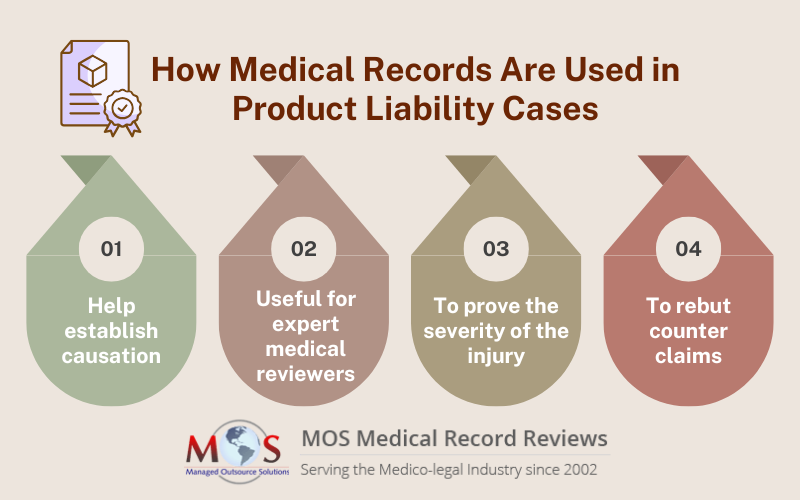Product liability cases turn out to be complicated most times, owing to the laborious task of accurately reviewing stacks of medical records to prove causation. Medical record review is essential in building a strong case in product liability claims, as they provide crucial evidence about personal injuries or health complications, because of defective or harmful products.
This blog will explore what medical records are, the types of medical records used and their role in product liability claims. We’ll also discuss the significance of diligent medical record reviews and how relying on an expert, third-party, medical record retrieval service can make all the difference.
Understanding Medical Records
A medical record is detailed documentation of a patient’s personal health information & history with healthcare providers. These can contain details regarding diagnoses, treatments, medications, lab reports and other clinical data relevant to understanding a patient’s health journey. Beyond patient care, medical records also serve as official documentation that can be used in legal/insurance cases to support health-related claims or liabilities.
Medical records are often held electronically as EHRs, but they can also exist as physical documents, depending upon the facility’s preference and/or the date of records (older records). In whichever form they may be, in a legal context, these records become inevitable evidence for both the plaintiff and defendant towards building a strong product liability case.
Types of Medical Records Reviewed in Product Liability Claims
Medical records are reviewed by legal experts to draw a picture of the claimant’s health before, during and after the use of the product in the case. The different types of records reviewed for product liability claims include:
- Hospital Records: These documents are related to the healthcare facility including admissions, treatments, emergency room visits and discharges. This will explain the severity and treatment of the issue caused by the product in question.
- Physician’s Notes: These include notes from healthcare providers regarding consultations, routine visits and treatments of the claimant with regard to the ongoing health issues related to the case.
- Lab Reports: These records can include imaging analysis (CT, X-Ray, MRI etc.) and pathology reports that support physical injuries/damages caused by the product. This is crucial in proving the existence and extent of the claimed injury/disease.
- Pharmacy Records: Medication records often include prescriptions, dosages and potential adverse reactions. This can prove to be crucial evidence in assessing how the patient’s health was affected after prescribing a particular drug.
- Surgical Reports: Operative reports can provide insights into the claimant’s nature and treatment which was caused by product-related injuries.
The Role of Medical Records in Product Liability Cases
- Establishing Causation: The most important role of a medical record in a product liability case would be to establish a direct link between the plaintiff’s injuries and the product in question. A detailed review of the medical record can reveal the truth, thereby either supporting or refuting the claim, put forward by the plaintiff.
- Gathering Insights from Experts: Expert witnesses rely on medical experts to translate health records and confirm whether they align with the product’s known risks. For instance, a toxicologist can provide insights into chemical exposure and its effects on the patient’s health.
- Demonstrating Severity: Medical records provide a detailed analysis of the plaintiff’s extent of injury and the treatment required. This has a role to play in the amount of compensation to be received if the case is won, as more severe injuries may receive increased rewards.
- Rebutting Counterclaims: Defendants may argue that the plaintiff’s injuries were pre-existing or caused as a result of other factors, not related to the case. Medical records can refute these claims by demonstrating the timing and progression of symptoms related to the case.
The Significance of Thorough Medical Record Review
An in-depth review of medical records can prove to be the difference in a product liability case. These documents, often voluminous, require expertise to identify relevant information and translate the data accurately. And therefore, the complexity it poses underscores the need for an expert team that understands both legal and medical terminologies.
Without a meticulous review, important details may be missed out which can weaken the case, leading to a less-favorable outcome. Additionally, inaccurate representation of these records can lead to costly errors which can damage the attorney’s credibility and even invite legal actions from either the court or the defendant.
Choosing the Right Partner for Medical Record Review
Managed Outsource Solutions (MOS) is a trusted name when it comes to providing high-quality & reliable medical record review services, for over two decades. Our team has the medical & legal expertise to review medical records for product liability cases, ensuring accurate and unbiased interpretation, ready for presentation. Our services also include deposition summaries, detailed review and expert consultation assisting legal firms in building strong cases that can produce results in your favor.
Experience the Power of Adept & Meticulous Medical Record Review
Partner with us for medical review services that make a difference!





